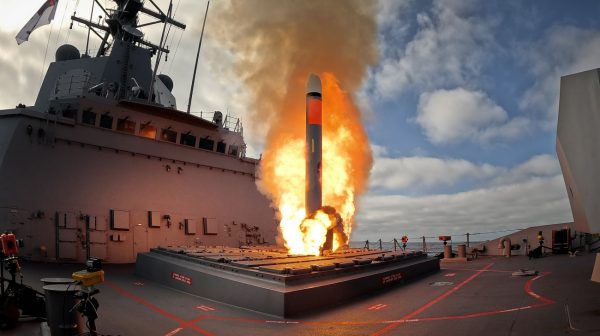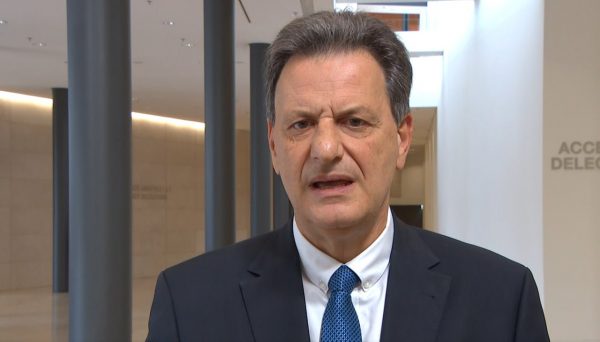
ABS is playing a leading role supporting the shipping industry’s efforts towards decarbonization through the safe adoption of new marine fuels and promoting energy efficient operations.
Our program of Joint Industry Projects, Approvals In Principle and Joint Development Projects is helping bring innovative fuel and hybrid propulsion solutions into the mainstream. A suite of value-added services provides further practical support to owners looking to sustainably lower their carbon emissions.
Of projects recently completed by ABS, the first ammonia-ready vessel in the world, the ABS-classed Suezmax tanker Kriti Future, has been delivered by New Times Shipbuilding to owners Avin International, flying the Greek flag.
Currently conventionally fueled, the vessel complies with the ABS Ammonia Ready Level 1 requirements, indicating it is designed to be converted to run on ammonia in the future. The vessel also meets the ABS LNG Fuel Ready Level 1 requirements.
This vessel represents a milestone in the development of the maritime industry and a step forward in the readiness to utilize alternative marine fuels. ABS’ alternative fuel ready suite of guidance and qualification programs is designed to give owners the flexibility they need and help prepare for a future in which alternative fuels such as ammonia take a bigger role.
The design for an innovative methanol-fueled bulk carrier has been developed in a JDP between ABS, SDTR Marine and SDARI.
SDTR supplied key operational data and SDARI developed the design with ABS support and review. ABS also provided an analysis of methanol as fuel market outlook, including a vessel performance evaluation in various operating scenarios including under the European Union’s Emissions Trading System.
Methanol is a fuel which has genuine potential to contribute to shipping’s decarbonization goals. ABS is working on industry-leading projects together with committed partners focused on delivering innovative solutions for the benefit of people, business and the environment.
ABS is also working with Hyundai Heavy Industries (HHI) and Korea Shipbuilding and Offshore Engineering (KSOE) to develop decarbonization technologies to support global sustainability ambitions. ABS, HHI and KSOE will jointly develop technical guidance for green hydrogen production from offshore platforms as a key first step to the design and construction of a facility by 2025. The project will utilize the electrolysis of seawater to generate green hydrogen. A second offshore carbon capture JDP is focused on securing an AIP for HHI and KSOE’s design for a CO2 injection platform for offshore storage. The platform is designed to be able to store 400,000 tons of captured and liquefied CO2 every year from 2025.
ABS has added to its industry-leading series of maritime technical guidance with the publication of Practical Considerations for Hybrid Electric Power Systems Onboard Vessels.
The publication explores the different forms of Hybrid Electric Power Systems and offers practical insight into their application on board. It explores renewable energy sources, energy storage systems, battery management approaches, the potential for modeling and simulation, and the impact to port infrastructure as well as the regulatory landscape.
To help shipowners understand the broader challenges of decarbonization, ABS provides a range of services providing access to the knowledge required to engage with cleaner shipping operations.
We have launched our Greenhouse Gas Inventory and Carbon Accounting which enables organizations to quantify their GHG emissions to understand their climate impact and set goals to limit emissions as well as define their footprint and contributions in Scope 1, 2 and 3 accounting categories.
This follows the launch of sustainability reporting and assurance services to help clients demonstrate their progress towards sustainable operations. This centres on a straightforward three-step process to simplify sustainability reporting, culminating in a detailed and authoritative sustainability report.
Our sustainability specialists are also able to provide sustainability assurance, independently validating an organization’s environmental, social and governmental reporting.
To bring this kind of approach to reality, ABS has partnered with Nakilat, one of the world’s largest LNG shipping operators to develop an industry-leading decarbonization strategy.
Over the past months, Nakilat’s project team has worked closely with ABS sustainability specialists to map out decarbonization pathways for the company’s fleet of 69 LNG carriers and four Very Large Gas Carriers. These efforts come as part of Nakilat’s drive to become a global maritime sustainability leader.
The project will ultimately see Nakilat’s vessels receive the ABS SUSTAIN notation, which demonstrates alignment with the United Nation’s Sustainable Development Goals and establishes a pathway for sustainability certification and reporting. 
*Vassilios Kroustallis, ABS Senior Vice President, Global Business Development
Latest News

DM Dendias: We talk With Turkey But We Always Bring Up Their Unacceptable Positions
Second and last day of closely watched conference, entitled 'Metapolitefsi 1974-2024: 50 Years of Greek Foreign Policy', also included appearances by PM Mitsotakis, Ex-PM Tsipras and PASOK leader Nikos Androulakis, among others

Rhodes Airport Tops Fraport Greece’s Regional Airports in 2024 Performance
According to Fraport's data, more than 35 million passengers (specifically 35.2 million) were handled by Fraport-managed airports during the 11 months.

European Central Bank Cuts Interest Rates by 25 Basis Points
It is the fourth cut of interest rates by Europe’s central bank, a move expected by the markets and financial analysts leading to the rate settling at 3%.

Airbnb: New Measures Add €600 in Extra Costs for Property Owners
Property managers face an immediate administrative fine of 5,000 euros if access to the inspected property is denied or any of the specified requirements are not met.

Economist: Greece Included in the Best Performing Economies in 2024
Meanwhile, Northern European countries disappoint, with sluggish performances from the United Kingdom and Germany.

EasyJet Expands Its Routes from Athens
The airline’s two new routes will be to London Luton and Alicante and they will commence in summer 2025.

Capital Link Forum Highlights Greece’s Economic Resurgence; Honors BoG Gov Stournaras
Capital Link Hellenic Leadership Award recipient, Bank of Greece Gov. Yannis Stournaras, an ex-FinMin, was lauded for his pivotal role during Greece’s economic recovery

Tourist Spending in Greece Up by 14%, Visa Card Analysis Shows
Greece’s capital Athens emerged as the most popular destination, recording a 17% increase in transactions with Visa cards, surpassing even the cosmopolitan island of Mykonos.

Inflation in Greece Unchanged at 2.4% in Nov. 2024
The general consumer price index (CPI) posted a 0.4% decrease in November compared to the previous month

2024 Christmas Holidays: Extended Shop Hours Schedule
The 2024 Christmas Holidays extended shop hours schedule commences on Thursday, December 12 and runs until the end of the year.


![Φυσικό αέριο: Δυναμικό come back του LNG στην Ελλάδα [γραφήματα]](https://www.ot.gr/wp-content/uploads/2023/01/OT_naturalgas-90x90.jpeg)












![Fraport: Πάνω από 35 εκατ. επιβάτες στα αεροδρόμια το 11μηνο – Πτώση στη Μύκονο [πίνακας]](https://www.ot.gr/wp-content/uploads/2022/06/fraport-90x90.jpg)


























 Αριθμός Πιστοποίησης Μ.Η.Τ.232433
Αριθμός Πιστοποίησης Μ.Η.Τ.232433